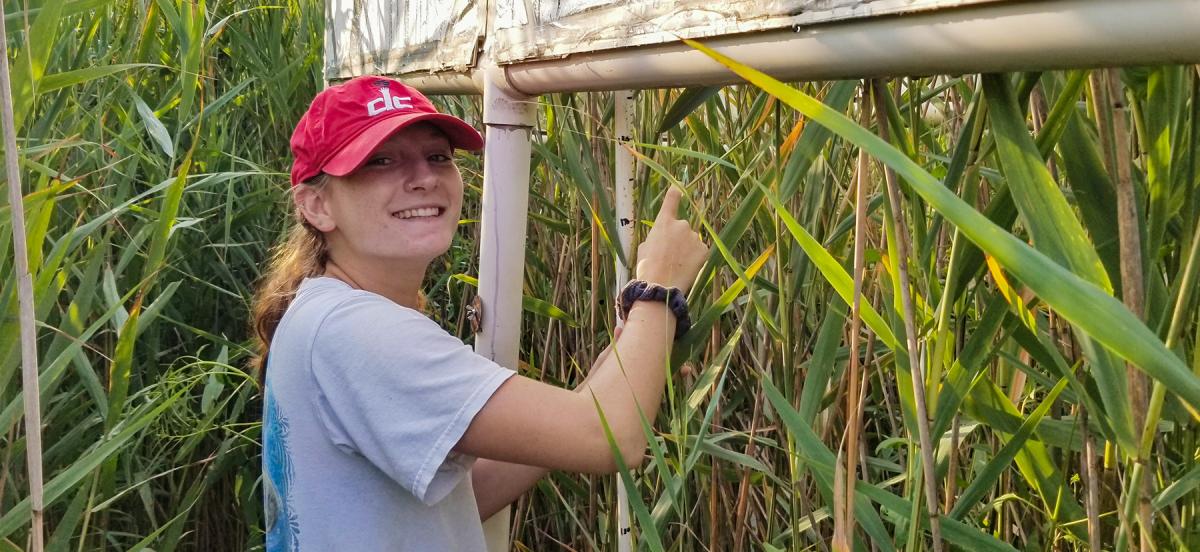Summer Centered: Julia Smeltzer '23 Connects Climate to Plant Life

Julia Smeltzer '23 is studying how Phragmites australis, common in salt marshes, responds to elements of global clilmate change
Details
The biology and environmental studies major is studying how changes in carbon and nitrogen concentration affect the plant life of salt marshes.
Salt marshes are a critical ecosystem, as they not only separate the land and sea, but also act as a key facilitator of carbon storage. Julia Smeltzer ‘23 is spending her summer studying these essential environments. The biology and environmental studies double major is researching the effects of pollution and modeling carbon storage in salt marshes with the C-EVO project at the Smithsonian Environmental Research Center (SERC). Her work at the Global Change Research Wetland (G-CREW) in Edgewater, MD, is sponsored by the Koshland Integrated Natural Sciences Center.
Smeltzer’s research focuses on how salt marshes respond to environmental changes, including pollutants, and how those changes impact their carbon storage capabilities.
“I am specifically working with the plant Phragmites australis, a common reed and model organism that is invasive to the U.S., and looking at how it is responding to global change factors, specifically elevated CO2 and nitrogen enrichment,” she said.
Smeltzer has been closely studying 300 plants that she is monitoring, each receiving varying levels of nitrogen and carbon dioxide, to provide her with an accurate picture of how these factors affect plant growth. In addition to constructing growth curves based on each plants physical growth, she is also measuring the photosynthetic rate of each plant using a LICOR-6400, and measuring the chlorophyll content and basal diameter of their leaves.
“The measurements that I make this summer will be used to create a model of the growing season carbon assimilation of each plant (gross primary product or GPP) and carbon storage in the marsh, to understand how not only phragmites, but also the marsh as a whole, will be affected by increasing anthropogenic carbon and nitrogen pollution,” Smeltzer said.
This is not Smeltzer’s first foray into the marsh; she worked at SERC last summer, conducting related research. The overall C-EVO project is now in its second of four years.
“I am making a bunch of the same measurements that I made last year, and will be able to compare the data from last year to data from this year to look at how the plants are changing over time,” she said.
Smeltzer was connected to SERC by Bryn Mawr College’s Tom Mozdzer, associate professor and chair of biology. Mozdzer runs the C-EVO project at SERC, but continues research on it in his own on-campus lab during the academic year, where Smeltzer has worked since spring 2021. He directs the project with Melissa McCormick.
As this research represents the perfect intersection of her two majors, Smeltzer will be writing her senior thesis on the C-EVO project, including both the work she has done in both Mozdzer’s lab and at G-CREW.
“I am interested in a career in ecological research, so I wanted to see what day-to-day life as a scientist in the field looks like,” Smeltzer said. “I am also just interested in learning about all the different projects that are going on at SERC.”
Smeltzer is joined in her SERC research by Skylar Livengood BMC ‘24, who is also a member of the Mozdzer lab. Livengood’s research is focused more on the genetics of the plants, though they are interested in combining their findings.
“Together we are looking at how the plants are evolving on both the genotypic and phenotypic level, and we will be trying to associate some of the phenotypic traits with specific genotypes,” Smeltzer said.
“Summer Centered” is a series exploring our students’ campus-supported summer work.



